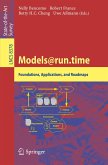This book presents reference architecture as a key blueprint to develop and evolve critical software-intensive systems, emphasizing both the state of the art in research and successful industrial cases.
After outlining the theoretical foundations of reference architecture and presenting an overview of a number of reference architectures proposed over the recent years, this book dives into a set of critical application domains, including defense, health, automotive, avionics, and Industry 4.0, highlighting the respective most relevant reference architectures that have impacted these domains, the experience and lessons learned, insights gained, benefits and drawbacks, and factors that make these architectures sustainable. The book finishes with the most relevant directions for future advances in reference architectures.
The content of this book is useful for researchers and advanced professionals in industry in the areas of computing and engineering, as well as in critical application domains that increasingly require interconnected, large, and complex software-intensive systems.
After outlining the theoretical foundations of reference architecture and presenting an overview of a number of reference architectures proposed over the recent years, this book dives into a set of critical application domains, including defense, health, automotive, avionics, and Industry 4.0, highlighting the respective most relevant reference architectures that have impacted these domains, the experience and lessons learned, insights gained, benefits and drawbacks, and factors that make these architectures sustainable. The book finishes with the most relevant directions for future advances in reference architectures.
The content of this book is useful for researchers and advanced professionals in industry in the areas of computing and engineering, as well as in critical application domains that increasingly require interconnected, large, and complex software-intensive systems.








